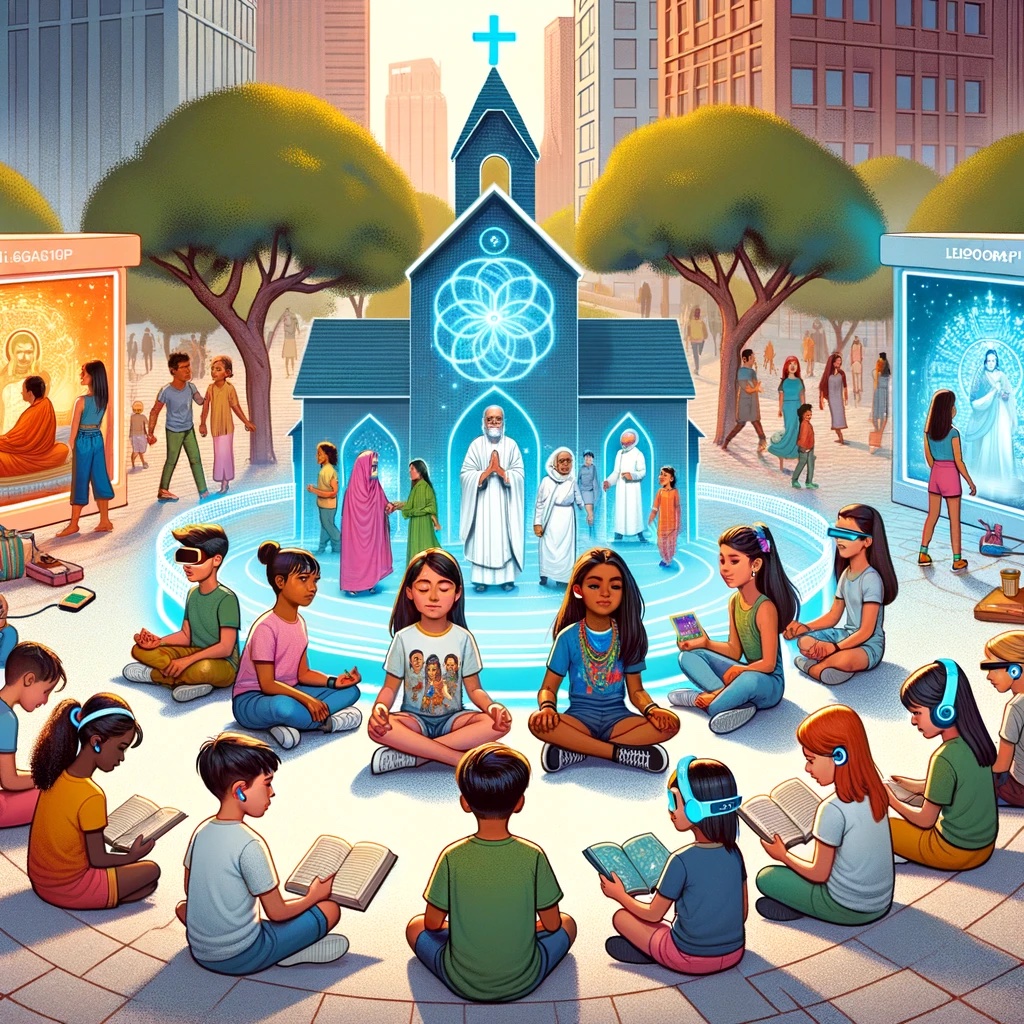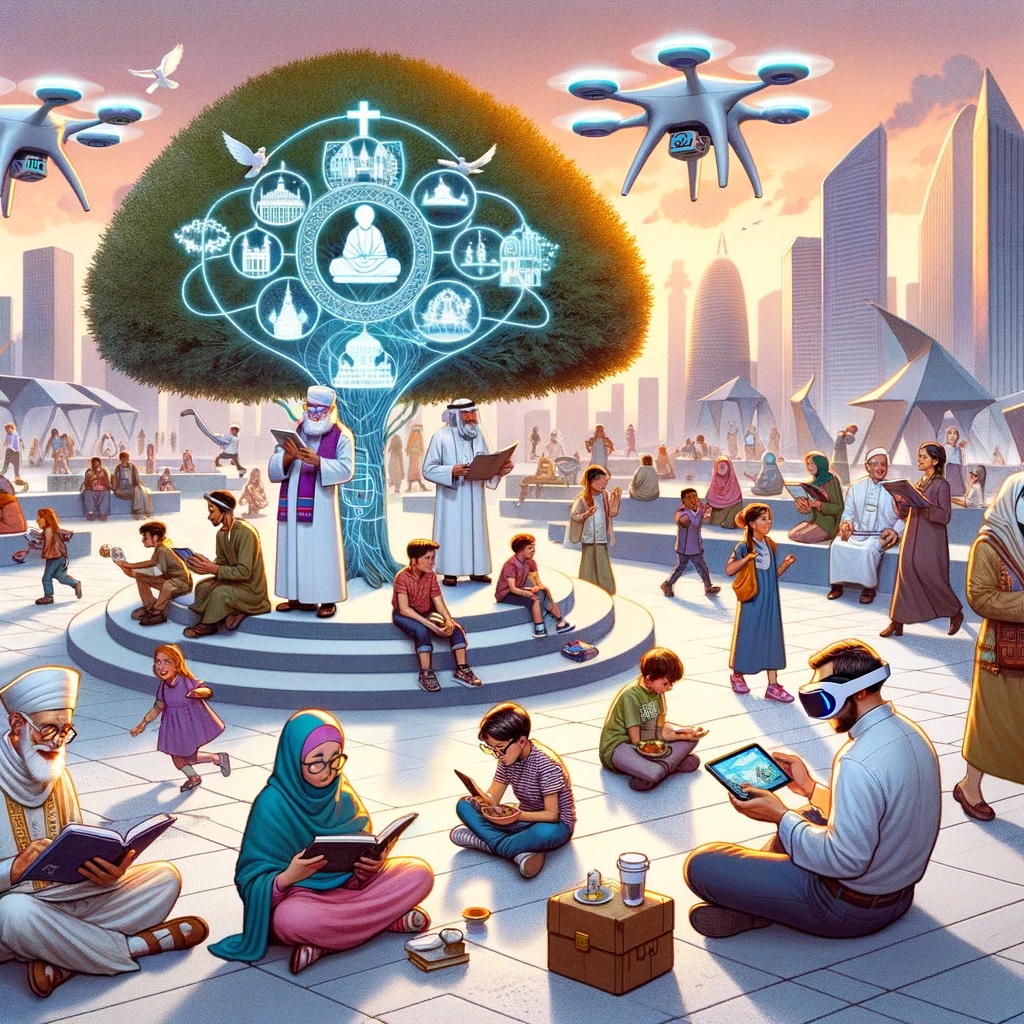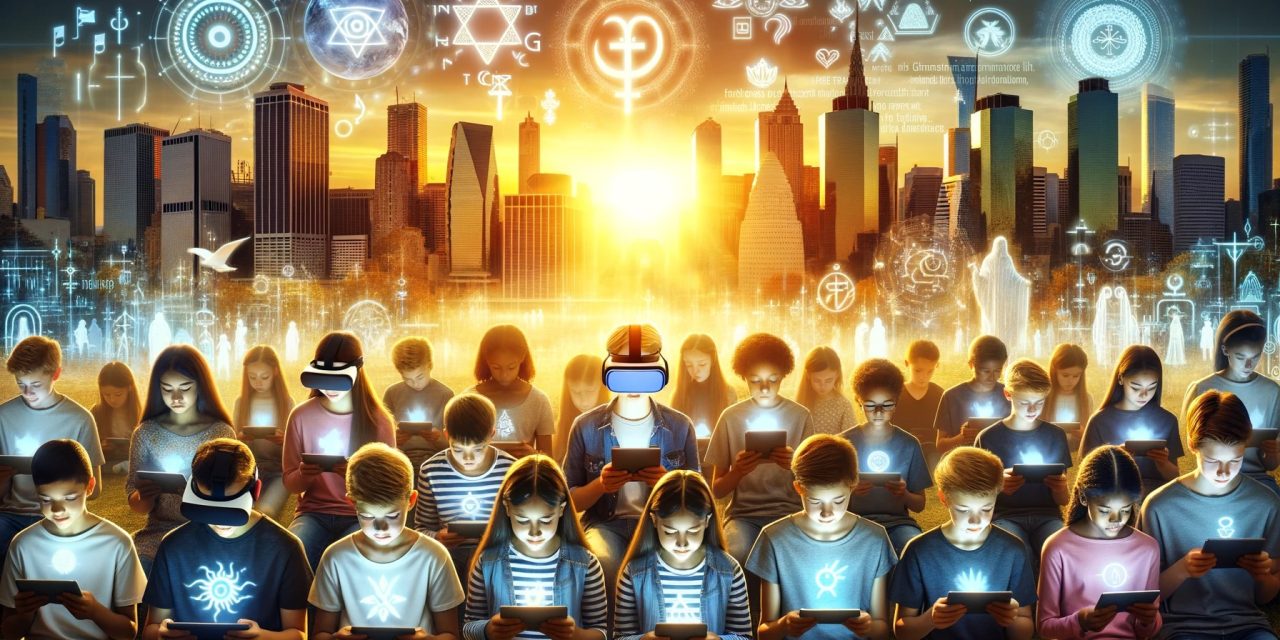As a Millennial parent of three young children who fall into this new generational category, I’ve been thinking a lot about what their faith practice and spirituality might look like. Will they relate to religion and God like I do? With some AI-assisted research, I’m doing something something I haven’t really done before on this blog, take a more sociological look at the future of spirituality. Also, in the spirit of this future, this post was written almost entirely by AI (a combination of Claude and GPT-4). I tweaked things here and there, gave the AI some feedback, and below is what you have. So it’s not entirely my voice, but I put my stamp on it.
A new generation is on the rise. Generation Alpha, born between 2010-2025, follows on the heels of Generation Z as the youngest and newest cohort. Numbering over 2 billion globally, Gen A (whose parents are Millennials) is stepping into a rapidly changing world facing evolving technological, social, and spiritual landscapes. As the first generation born entirely in the 21st century, how might Gen A engage with spirituality and religion compared to generations past? What changes and challenges lie ahead for churches and ministries seeking to connect with this emerging generation? And how might artificial intelligence (AI) shape Gen A’s spiritual and religious experiences? These questions warrant reflection as we look ahead at the future of faith and spirituality.

Suggested by and created by DALL-E 3
Defining Gen A
Gen A has a few key defining characteristics. They are children of Millennials, the largest generational group, and are growing up in an increasingly unconventional setting with changes in family structure. Gen A is the most materially endowed, technologically literate, and formally educated generation yet, with almost unlimited access to information. They are true “digital natives”, exposed to the internet, social media, and technology from a very early age.
Current statistics point to Gen A being a post-institutional religious generation. Many may not have the traditional connection to the church that was a mainstay in previous generations. This doesn’t imply that they will lack spirituality, though. On the contrary, they might engage more profoundly in personalized, value-based spirituality, drawing on global resources and viewpoints, thanks to their digital fluency.
Socially Conscious Values
Gen A appears to hold socially conscious values stemming from their diversity and early exposure to social issues. Top priorities include helping people in need, protecting individuals from bullying, accepting people for who they are, and looking after the environment. This generation seeks authenticity and values connections with others. Their outlook seems oriented towards bettering society and helping people – values that may intersect with faith-based ideologies. Many from Gen A may find resonance with religious teachings focused on loving others, fighting injustice, and living with moral conviction.
Non-Traditional Families and Declining Religiosity
However, Gen A is also coming of age in a period of declining religious affiliation and practice worldwide. They are the first generation to be born into non-traditional family structures and dynamics as the norm. More come from divorced homes or were born to single parents compared to previous generations. Surveys also indicate a continued increase in number of Americans who claim no religious affiliation.
Additionally, Gen A is showing signs of decreased interest and participation in institutional religion thus far. As digital natives, their connection to faith communities may be more sporadic and virtual. Two trends are worth noting:
Firstly, the role of parents in shaping Gen A’s spirituality remains vital. Research indicates the majority of Gen A will have had no connection with a church at all as a child unless their parents facilitated that engagement from a young age. Faith communities aiming to reach this generation may need to better equip and support parents in having faith conversations at home.
Secondly, Gen A appears less compelled by institutional religion due to disillusionment with rigid structures and lack of tolerance of diversity. As this generation seeks authenticity, transparency, and values diversity, they may gravitate to more personalized faith experiences outside traditional religious institutions.

Suggested by and created by DALL-E 3
The Impact of Artificial Intelligence
A defining force that will uniquely shape Gen A’s experiences and beliefs is artificial intelligence (AI). Gen A will be the first to mature alongside rapidly advancing AI technologies. How might human-AI interaction shape their relationship with spirituality and religion?
On the one hand, AI could make religious and spiritual practices more accessible. Personalized apps could deliver customized meditation, prayer routines, or scripture reading plans tailored to an individual’s preferences. AI algorithms can connect users to online faith communities that match their interests and values. VR and AR technologies may even create immersive spiritual experiences. AI could also introduce users to diverse religious ideas from around the world.
However, experts raise concerns about boundaries between humanity and divinity as AI becomes more integrated into religious contexts. The advent of AI companions, while seeking to provide comfort and guidance, surfaces existential questions about consciousness and the human experience. Theologian Ilia Delio offers an alternative optimistic view – that technology is part of continuous human evolution, through which God is at work. In her view, instead of replacing human roles, AI innovations are part of the new creation unfolding, enabling expanded knowledge and outreach if oriented ethically. Still, personalised AI could propagate spiritual individualism over community belonging. Overreliance on technology in moral and spiritual development may be detrimental if not tempered with human wisdom and relationships.
As Gen A grows up immersed in AI, thought leaders suggest AI may prompt deeper questioning around existence, morality, and the human spirit. Navigating the ethics of technological advancement could spark new spiritual dialogues. The influence of AI thus presents both opportunities and challenges for religious institutions hoping to meaningfully engage youth.

Suggested by and created by DALL-E 3
Ignatian Spirituality as a Bridge
While the religious landscape is changing, the human longing for meaning and purpose remains constant. As everyday life moves increasingly online, spiritual practices focusing on presence may take on renewed value. Silence, awareness, and inner tranquility will be a welcome antidote to information overload. Spiritual foundations emphasising slowed living and deep human connection will resonate across generations if made accessible.
Ignatian spirituality, with its timeless tools for spiritual growth and discernment, can anchor Gen A amidst the flux of technological change. By teaching young people to tune inward, reflect, and align choices with their deepest calling, it equips individuals to navigate life wisely. Though expressions of faith may evolve across generations, these foundational values and tools for spiritual growth will continue holding relevance for human flourishing.
Rather than growth in attendance and religious affiliation, signs of successful ministry may become more qualitative: Are young people growing in their ability to give and receive love? Are their lives marked by meaning, purpose, and connection to something greater than themselves? Do they feel empowered to positively impact their communities? By focusing on nurturing their spiritual life, faith communities can walk alongside youth on their journey of becoming fully human.
Gen A is forging new territory at the intersection of technology, spirituality, and changing social dynamics. As the religious landscape continues to evolve, the onus falls on faith communities to listen humbly, meet youth where they are, and revive the heart of their message in innovative ways. By walking compassionately with the next generation, we can illuminate the path ahead with God’s eternal love.
The images in this post were created by DALL-E 3, the prompts suggested after ChatGPT read this post.
Listen to the podcast version of this post…









Interesting take on the future – and great idea to use AI to write it. As scary as the world looks, the young always bring hope for renewal and we have to believe the Holy Spirit is here with us fulfilling God’s plan
Now, more than ever our identity as sons of God in Christ Jesus is of the utmost importance